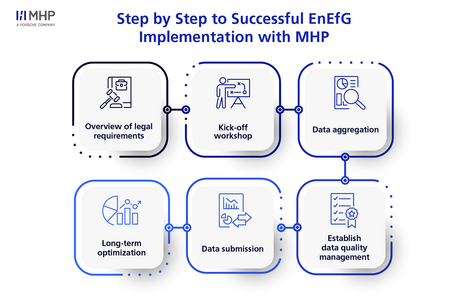
- Blog, Digital Transformation
- Published on: 20.08.2024
- 10:56 mins
Focus on Energy Efficiency: Why Data Centers Need to Prepare for the Future
The Energy Efficiency Act for data centers: What companies need to pay attention to
Current developments clearly demonstrate the sharp increase in demand for computing power and the associated CO₂ emissions. A recent example is the US company Google, whose greenhouse gas emissions have risen by nearly 50% in just a few years due to energy-intensive data centers for Artificial Intelligence (AI). According to Google's annual sustainability report, CO₂ emissions last year amounted to 14.3 million tons – a 13% increase compared to the previous year. This trend underscores the urgent need to enhance energy efficiency in data centers.
With the increase in digitalization, companies not only face the challenge of keeping up with rapid technological advancements but actively having to shape them. Those who fall behind in this race risk being overtaken by competitors. However, digitalization demands not only technical expertise and structural changes but also substantial amounts of energy to operate high-performance data centers.
In this context, energy efficiency and sustainable operations in data centers are becoming increasingly important. The European Green Deal, the EU Taxonomy for Sustainability, and the German Energy Efficiency Act (in German: Energieeffizienzgesetz, short: EnEfG) aim to drastically reduce CO₂ emissions in the EU. The EnEfG specifically calls for a reduction in the energy consumption of data centers, presenting significant challenges for operators.
To meet these requirements and simultaneously enhance energy efficiency in the long term, a comprehensive adjustment of processes and structures is necessary. MHP, as a knowledgeable and experienced partner, provides holistic end-to-end support. Discover what this means for your company and how MHP can support you in achieving these goals in this blog post.
What is the Energy Efficiency Act for Data Centers?
The Energy Efficiency Act came into effect in Germany on November 17, 2023, with the goal of reducing energy consumption in data centers and thus contributing to achieving climate targets. It applies to all companies operating data centers with a nominal connection power of 300 kilowatts or more. According to German law, a data center is defined as "a structure or a group of structures for the central housing, central connection, and central operation of information technology and network telecommunications equipment for providing data storage, data processing, and data transport services" (§3, para. 24a) EnEfG). The only exceptions are data centers that serve as connections for other data centers and do not perform their own data processing (see §3, para. 24c) EnEfG). For companies operating data centers under the EnEfG, this means they must provide detailed information about their energy consumption and energy efficiency.
Energy Efficiency Act: These Are the Challenges
If your company operates a data center in compliance with the EnEfG, you will likely face several hurdles imposed by the legal regulations that must be overcome:
Strict Timeline and Extensive Requirements
While many other laws often allow for a comfortable transition period, the EnEfG sets very strict timelines. Both existing data centers (operational before June 2026) and new data centers (operational from July 2026) must operate with at least 50% renewable energy from July 2024, and with 100% renewable energy from July 2027, according to §11, para. 5 EnEfG. Additionally, there are stringent requirements for the energy efficiency of data centers. New data centers must achieve a maximum PUE ("Power Usage Effectiveness") of 1.2 from July 2026, while existing data centers have slightly more lenient targets, with a maximum of 1.5 (from July 2027) and 1.3 (from July 2030). Furthermore, new data centers must also meet ambitious energy recovery targets (ERF = "Energy Reuse Factor"), increasing from a minimum of 10% (from July 2026) to a minimum of 20% (from July 2028).
Regular Revisions of the Law
The Energy Efficiency Act is regularly updated, which can introduce additional requirements and adjustments to the timeline. Therefore, your strategy for implementing the requirements should be very flexible to respond to potential changes or extensions to the law without requiring extensive restructuring.
Reporting Obligations and Data Management
To comply with the stringent metrics of the Energy Efficiency Act and report to the relevant authorities, intelligent data management is essential. However, without clear responsibilities and structured data governance, significant problems can arise. These may include gaps in data collection, duplicate entries, and inadequate plausibility checks and validation of data. Such deficiencies lead to poor data quality, which can result in incorrect decisions and ineffective measures. Therefore, clear organizational structures and responsibilities are crucial for providing high-quality data and ensuring compliance with the EnEfG.
Awareness Within the Organization
Alongside structural weaknesses, many companies have not yet sufficiently raised awareness about energy efficiency at both operational and management levels. It is not enough to integrate rules and processes into the process management environment without a well-planned rollout phase.
Financial Challenges
Like many efforts toward greater sustainability and efficiency, the EnEfG comes with numerous regulations that require significant financial investments for organizational and technical changes and expansions.
Penalties and Reputational Risks
However, avoiding the mentioned investments is not a financially viable long-term solution, as non-compliance with the EnEfG can result in fines according to §19 EnEfG. Additionally, your company should prepare for potentially severe reputational damage, which could, in the long run, be even more damaging than the fines themselves.
Regulatory Requirements at the EU Level
The requirements of the Energy Efficiency Act in Germany are part of a broader set of regulatory requirements at the EU level that companies must also meet. The EnEfG implements the European Union's Energy Efficiency Directive (EED) in Germany. This directive aims to reduce energy consumption across the EU and promote sustainable practices. Additionally, a reporting obligation in the form of a registry will be introduced at the European level, which is particularly relevant for data center operators active in multiple EU countries. These new requirements make it essential for companies to stay informed about and comply with both national and European regulations.
Complex Definitions in Legal Texts
It is often unclear whether and when data centers are affected by the Energy Efficiency Act, particularly concerning nominal connection power and co-locations.
These Specific Recommendations Can Help You
To tackle these numerous challenges, there are several specific recommendations that you can adapt and implement depending on your company:
- Early awareness within the organization:
The most important step is to raise awareness about sustainability among your staff. Thoughtfully designed awareness campaigns are particularly effective in enhancing understanding of energy efficiency. - Building a community:
Create a cross-company community for sustainable IT and energy efficiency to promote collaboration and define responsibilities. Avoid imposing limitations such as hierarchical levels; instead, allow all interested parties to participate in the exchange of ideas. - Integration into the overall sustainable IT strategy:
Embed energy efficiency into the general IT strategy to leverage synergies. - Review all your data centers:
Ensure that you assess all data centers for compliance with the EnEfG. - Utilize digital data sources:
To maximize the use of your data, implement intelligent software solutions for capturing and analyzing the necessary data, and automate workflows as much as possible. - Central approach model:
Develop a central template for data collection and use common touchpoints for coordination. MHP's templates can be of great assistance in this process. - Early registration in the EnEfG register:
Ensure that all necessary access for registration is in place and that the responsible departments are involved. The sooner you establish your interface with the EnEfG register, the sooner you can focus on implementing the requirements within your company.
How MHP Can Support Your Company in Implementing EnEfG Requirements
At MHP, you will find a reliable and skilled partner with years of experience. We will guide you through the successful implementation of EnEfG requirements and provide support every step of the way. We offer proven, practice-tested templates that help you identify pain points early, implement appropriate countermeasures, and monitor their effectiveness.
Our end-to-end concept guarantees you comprehensive, all-encompassing support:
- Overview of legal requirements:
We will work with you to gain an understanding of the EnEfG requirements and identify relevant stakeholders and potentially affected data centers. - Kick-off workshop:
In an initial workshop, you will collaborate with MHP experts to identify the affected data centers and their responsible stakeholders. - Data aggregation:
Begin the collection and preparation of data for further processing for each relevant data center. - Establish data quality management:
MHP will help ensure that all data sources and processes for managing verified information are in place. - Data submission:
With the support of MHP, submit the prepared, transparent data to the EnEfG register. - Long-term optimization:
Collaborate with MHP to define the next steps for continuously improving energy efficiency, ensuring you are well-prepared for potential future regulatory changes and able to respond quickly.
Benefits of Partnering with MHP
Partnering with MHP offers numerous benefits that go beyond traditional services. With a holistic approach based on an end-to-end concept, MHP guides its clients through all project phases, from planning to implementation and beyond. This comprehensive support ensures seamless and integrated processes and systems throughout.
A key advantage of working with MHP, beyond merely meeting regulatory requirements, is the significant improvement in energy efficiency and sustainability in line with the EnEfG. Through targeted measures and innovative solutions, your company can not only reduce energy costs but also enhance its environmental performance. This substantially contributes to risk minimization, as higher energy efficiency often leads to increased operational reliability and reduced maintenance effort, while simultaneously ensuring compliance with legal regulations.
This partnership with MHP provides you with a clear competitive advantage. MHP's extensive expertise in digitalization and IT, including cloud solutions and data centers, enables you to optimize your business processes and develop new digital business models.
MHP also boasts a comprehensive sustainability portfolio and recognized expertise in energy efficiency and sustainable IT. This expertise helps companies design their IT infrastructures sustainably, making a significant contribution to environmental protection.
Overall, partnering with MHP not only provides comprehensive support and enhances energy efficiency but also minimizes risks and delivers a decisive competitive advantage through digital transformation. Contact MHP for personalized advice and tailored solutions to meet EnEfG requirements with the help of our experts!
Conclusion: Successfully Overcome Efficiency Challenges in Data Centers with MHP
For a sustainable future and to achieve climate goals, it is essential to increase the efficiency of industrial facilities, reduce energy consumption, and shift from fossil fuels to green energy. Data centers, which are increasingly coming into focus with digitalization, represent a significant portion of the total energy demand of a modern company, and therefore must also actively contribute to climate protection under the EnEfG. Early and comprehensive implementation of the requirements can not only minimize legal risks but also significantly enhance the energy efficiency and sustainability of data centers in the long term. MHP is your reliable partner, guiding you through this process and ensuring your data centers are fully prepared for the future.
FAQ
The EnEfG mandates specific requirements for data centers to improve their energy efficiency. A key requirement is the regular implementation of energy audits, which are essential for analyzing energy consumption and identifying potential savings. Additionally, data centers are required to implement measures to improve energy efficiency, such as optimizing cooling technology and using energy-efficient hardware. The use of renewable energy is also increasingly expected. Furthermore, data centers are obligated to regularly report their energy consumption and the savings achieved.
Under the EnEfG, data centers are required to report a range of specific data. This includes the total energy consumption of the data center and its distribution across various energy sources. They must also detail the energy efficiency measures implemented and their impact on energy consumption. Data centers must report the proportion of renewable energy in their total energy use, as well as the achieved energy savings and the results of conducted energy audits. The data is reported in a public energy efficiency register.
The implementation of energy-efficient technologies and processes, such as modern heating, ventilation, and air conditioning systems, can significantly reduce energy consumption. The use of renewable energies, such as solar or wind power, also contributes to increased energy efficiency. Employees should be continuously trained and made aware of energy-efficient behavior. Additionally, ongoing monitoring and optimization of energy consumption through an energy management system is recommended. Furthermore, companies should take advantage of government funding programs and incentives to support investments in energy-efficient measures.
Initially, there is the risk of financial penalties in the form of fines, which can vary depending on the severity of the violations. Additionally, companies may be excluded from government funding programs and financial incentives, leading to further economic disadvantages. Another risk is damage to the company's reputation, as the public and business partners increasingly focus on sustainable practices. Lastly, inefficient energy use can result in higher long-term operational costs, which may impact the company’s competitiveness.
MHP is a reliable and experienced partner that supports companies in implementing EnEfG requirements. With proven templates, MHP helps you identify pain points early on and take appropriate measures. Our end-to-end concept with comprehensive support includes an established approach to complying with all relevant legal regulations. Collaboration with MHP improves energy efficiency, reduces energy costs, increases operational reliability, and ensures compliance with legal requirements. Additionally, MHP’s expertise in digitalization and IT enables the optimization of business processes and the development of new digital business models.





